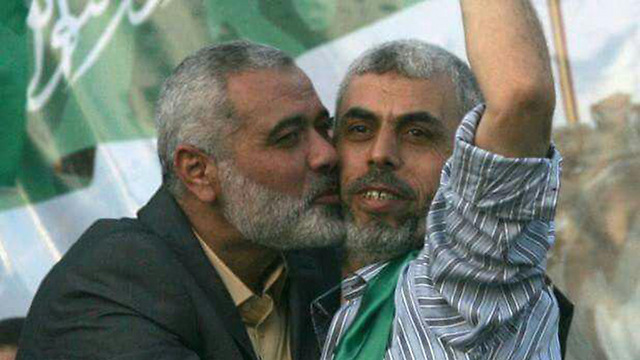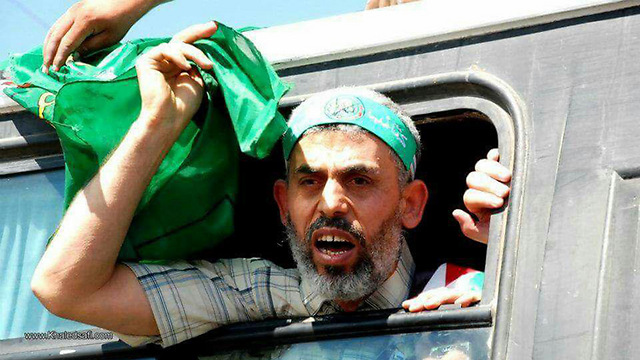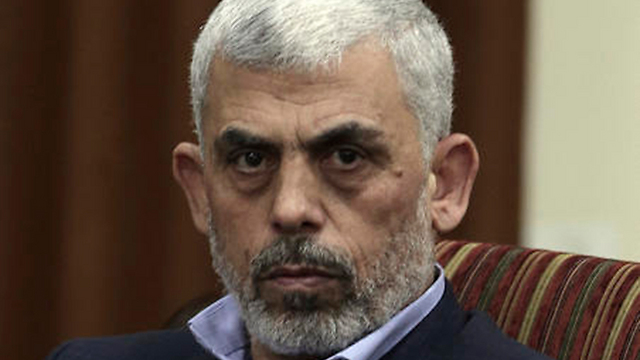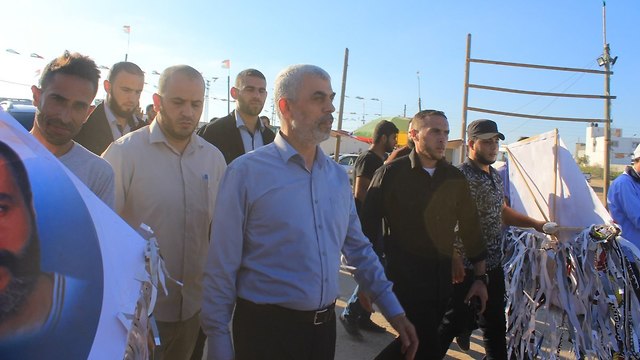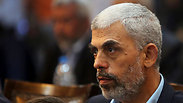
Sinwar: Prisoner swap is separate issue to truce deal
In flattering piece, British Telegraph quotes comments from August by Hamas leader in Gaza, who said Israel's insistence to include prisoner exchange issue in any possible ceasefire arrangement might jeopardize chances of reaching agreement.
Hamas’ leader in the Gaza Strip, Yahya Sinwar, has conditioned a ceasefire deal with Israel on the lifting of the Gaza blockade and insisted a prisoner swap deal should be reached separately, according to a Thursday report in the British Telegraph newspaper.
Two months ago, Sinwar held a five-hour long strategy presentation with a number of Palestinian journalists at his Gaza City headquarters, where he stressed that Hamas and other Palestinian factions in the strip would halt rocket attacks and violence along the border fence with Israel if the arrangement through indirect talks is reached by mid-October.
However, the 55 year old underlined that if the negotiations collapse, the violence and mass demonstrations along the security fence would escalate.
“If there is no deal, he made it clear that Hamas will turn the table upside down on the heads of everyone. The Israelis, the Palestinian Authority, the Egyptians … Everyone is going to suffer,” said Palestinian analyst Mkhaimar Abusada, who was at the meeting.
Since August, when Sinwar’s conference took place, the Egypt-mediated talks have indeed halted and the violence along the border, as well as the arson terrorism, have significantly intensified.
The Telegraph article is very flattering to the terror group’s leader, describing him as a man of the people. According to the article, Sinwar speaks plainly and still has Friday afternoon dinners with his friends in Khan Younis—where he reportedly lives in a small house, the exact location of which remains unknown due to security concerns.
“When you talk to him, sometimes you’re speaking with a statesman, sometimes you’re speaking with a man from the street,” Abusada told the Telegraph.
Despite being a ruthless leader, who reportedly killed suspected Israel collaborators with his bare hands, Sinwar is described by the Telegraph as a devoted father, who, according to Hamas spokesman Hazem Qassem, is “very involved” in his children’s lives and even brings them to his workplace.
“He plays with them in a way we don’t do with our kids … I assume it’s because he’s been waiting in prison for these kids for a long time. He also believes he’s on the Israeli wanted list and so these kids may lose their father. So he increases the dose of love,” the spokesman opined.
Sinwar said earlier this year that he knows he is endangering his children’s lives due to his involvement with Hamas’ military wing, and believes his life will end as a shahid (martyr).
“The first word my son learned to say, after mama and dada, was ‘drone’. Because there are are drones hovering all over the place,” he bemoaned.
Israeli security officials have confirmed Sinwar's fears, saying the IDF wants the controversial leader dead.
“Sinwar is in the front row of terrorists who want Israel gone. But he is a very patient person and he understands that for the time being Israel is not going anywhere. He is willing to postpone his vision and deal with the reality,” said one Israeli official.
The Telegraph quoted some reports that Sinwar was diagnosed with a brain tumor during his time in Israeli prison, which required an urgent operation. Israeli surgeons reportedly conducted the needed procedure and saved his life.
“He said Israeli mothers came to visit him and they were so kind. That was the first time he had been that close to the Israeli civilian community. He told me: ‘A mother is a mother, the Jews don’t want to lose their children either,'” said Abu Mostafa, Sinwar’s neighbor from Khan Younis.
While in jail, Sinwar also managed to learn Hebrew by consuming written Israeli media, especially Yedioth Ahronoth, which was a favorite of his, according to the Telegraph.
“He wanted to know all the time what was happening in Israel. He followed all the military and political developments,” said Helal Jaradat, Sinwar’s jailmate, who was convicted for stabbing to death an IDF soldier.
Although the Hamas leader’s hatred for Israel did not change after he left prison, he became more tolerant of rival Palestinian factions, going as far as to hold question-and-answer sessions with members of other groups.
“He stopped being an extremist fanatic ... He’s now a political leader in Gaza and he believes in political partnership,” added Tholfikar Swairjo from the Popular Front for the Liberation of Palestine.
One of the main reasons why the possible long-term ceasefire arrangement might not be achieved is the prisoner exchange issue, which Israel sees as an integral part of any agreement with the terror group.
Sinwar, on the other hand, believes the prisoner swap issue should be discussed in a separate deal between Hamas and the Israeli government, since this matter might take years to resolve and is certainly not achievable by mid-October.
“Today we have 6,000 Palestinian prisoners (in Israeli jails) suffering from humiliation 24 hours a day, 7 days a week. They don’t have any opportunity to be free unless there is a swap between us and the occupation,” Sinwar stressed.
An Israeli official said the terror group’s leader sympathizes with the prisoners since he spent 22 years in jail himself.
"He has a deep sense of obligation to the prisoners. He was a prisoner himself and he left some of his his friends behind in Israeli prison," he added.










